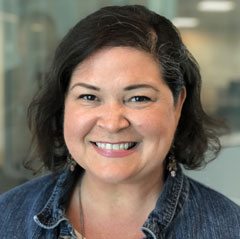Elizabeth Garza-Guidara, Master of Arts in Latin American and Caribbean Studies, 2022

Feb 20, 2023, 11:30 AM.
An alumna with a military background refines her knowledge with a program that helps reveal her passion for diversity, equity, and inclusion (DEI).

When Elizabeth Garza-Guidara volunteered with a non-profit organization in Colombia to help young, socioeconomically disadvantaged Afro-Colombian girls, the decorated military officer recognized the structural and pervasive impact of racism and sexism on these girls.
Observing these heart wrenching patterns of oppression helped Garza-Guidara discover just how deeply personal DEI was to her.
While collecting data and observing the radical socioeconomic gap between white and Afro-Colombians, she saw firsthand that the young girls not only faced structural barriers to success, but they were also systematically conditioned to feel inferior.
“Developing the mentorship program was very rewarding work,” she says as she explains the far-reaching positive outcomes that would come from its implementation.
This mentorship program underscored her drive and merged with the knowledge she gained from her Master of Arts in Latin American and Caribbean Studies. Garza-Guidara immediately comprehended that DEI efforts are universal (not just for large corporations) and can be applied in many ways to help marginalized communities—especially those, like the one she was visiting, in Latin America.
Now a full-time DEI consultant, Garza-Guidara is also a career Air Force intelligence reserve officer currently serving at United States Southern Command within the Transnational Threats and Intelligence Division.
A recent graduate, she has spoken freely about how her military career, DEI consulting, and graduate program intersect. In the following dialogue, she offers her perspective on the M.A. in Latin American and Caribbean Studies.
What do you do in your current role?
As an independent DEI consultant, I help organizations formulate strategies to make communication, marketing, employee engagement, and talent management systems, processes and practices more inclusive. Doing this has a positive domino effect on collaboration and productivity. Leveraging diverse talent in an inclusive manner (and from many angles) gives my clients’ employees a sense of psychological safety to bring their most authentic selves to work.
In my part-time job as an Air Force Reserve Officer at United States Southern Command, I conduct research on transnational organized crime organizations throughout Latin America and the Caribbean.
What was your favorite class and why?
Diversity in the Workplace was my favorite class because it resonated with me at a deeply personal level as a woman, a person of color, a military veteran, and a transracial adoptee. It helped me recognize my own privilege as a heterosexual, fully able-bodied person, and also gave me the opportunity to soak up a vast array of knowledge on the structural and systemic nature of oppression in global society.
What immediately applicable skills did you learn?
Conflict resolution techniques and cross-cultural pattern recognition.
How does your degree help you in your work?
My degree helped me to better understand how marginalization is expressed and perpetuated throughout a variety of cultural contexts throughout the Western Hemisphere. My in-depth research of gender and race relations in Colombia, the Dominican Republic, El Salvador, and Peru enabled me to see these patterns of marginalization. When I was deployed to Cartagena, Colombia for a counterdrug mission, my degree armed me with a better understanding of how to tailor a mentorship program for young socioeconomically disadvantaged Afro-Colombian girls with the nonprofit I volunteered for. Recognizing patterns of marginalization while simultaneously understanding how different social identity groups are impacted by policies or practices is a core aspect of being a DEI professional.
Why did you decide to study this area and choose this program?
In 2020, I enrolled in the M.A. in Latin American and Caribbean Studies program because obtaining graduate level credits focused on exploring a specific region of the world was necessary to become an Air Force Foreign Area Officer. This was a major career goal of mine ever since I was commissioned as an Air Force Officer in 2013. As a Foreign Area Officer, I aspire to build strong partnerships with military officials from Latin American and the Caribbean.
What is something you learned that you won’t forget?
During a Survey of the Caribbean course, I conducted research on Trujillo’s arrangement of the genocide of over 40,000 ethnic Haitians in the Dominican Republic. Learning about eugenics-based strategies that Trujillo and his elites used to “cleanse” the Dominican Republic of Haitians shocked me, which ranged from mandating that the Dominican Army slaughter Haitians with machetes (to make it look like a border dispute between ranchers and farmers) to a full-blown campaign demonizing voodoo and Haitian culture as well as renaming Creole villages/cities in the Dominican Republic with Spanish names.
Would you recommend this program to other students?
Yes, absolutely!
